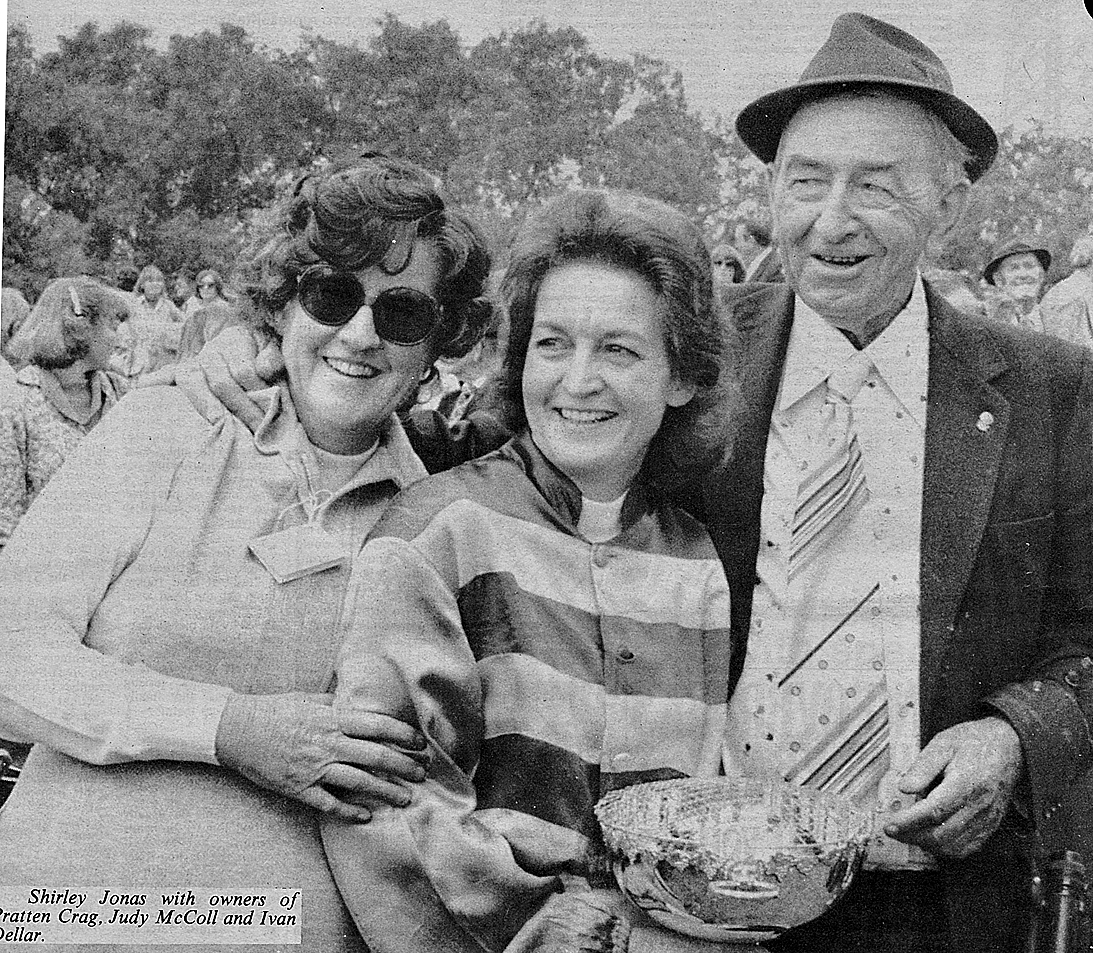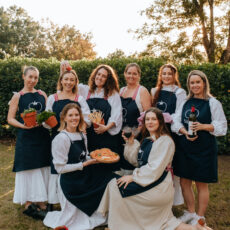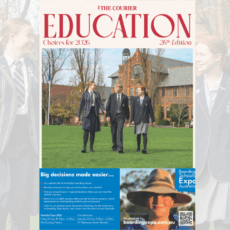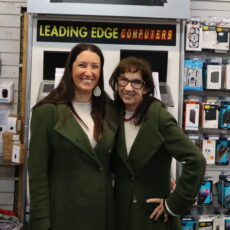Well-behaved horsewomen rarely make history, and when Shirley Jonas rode gelding Pratten Crag to victory at the Narrabri Picnic Races in 1979, she had no idea that her victory would become a historic win for all proficient horsewomen in NSW, when she claimed the title of first female jockey in the state to win a horse race against men.
A true anomaly, in a time when women on the track were a rare sight, Shirley’s intentions for entering the race weren’t after any lengthy pursuit, but in fact what she declares as sheer “pigheadedness” to prove a point. And of course, the only way she was going to do that, was to run that race herself.
“When you think about it, entering your first race at 45 years old is a pretty stupid thing to do, you have to be pretty pigheaded to go out there to prove a point,” she laughed.
When she returned to present the Jockey Challenge cup at the 2024 Picnic Races, Shirley’s remarkable story came to light, and yet the first words to come out of her mouth when asked to retell the tale of riding the winner of the 1979 Picnic Cup were, “I don’t want a big story”.
The historic win took place at the Narrabri Picnic Race Club Cup on Wednesday, June 13, 1979, when Shirley was 45 years of age, a mother, and grandmother, and working as a barmaid at The Caledonian Hotel, “dispensing the good drop”.
Now, with her 90th birthday milestone just around the corner, she has an impressive legacy behind her, including her three daughters, six grandchildren, and five great-grandchildren.
A rider of some 20 years at the time, she won the club trophy on the five-year-old gelding, that was part-owned by Narrabri resident, Mr Ivan Dellar and the late Peter McColl.
An article in The Land Magazine at the time when she collected the trophy included a statement from Shirley, “What I like is that it is the thin end of the wedge for girl riders.”
Shirley was born in Corowa, down on the banks of the Murray River in NSW.
A self-proclaimed gypsy, she reckons she got her liking to wander from her father, who happened to be in both world wars, and moved many times before then, when he worked as a farmer.
Her first interest in horses sparked when her family moved to Scone, where her father took up a job growing lucerne and fodder crops for horse feed on a stud farm.
At 15 years old, Shirley found herself hanging around the stables, feeding the horses, taking them for walks, and even riding a couple of stallions for exercise.
“There were horses everywhere, it was absolutely wonderful,” said Shirley, who at one point, rode a pony the seven-kilometre distance to school.
While she was quite content to be in the presence of these magnificent beasts, it wasn’t until her family’s next move to Coonabarabran, where a horse trainer down the road from her new home inspired her to become more involved.
It was with him that she got her first job with horses, doing trackwork alongside her future husband Barry Jonas, who was a jockey at the time.
“That’s when I started to gain a keen interest in horse racing because I was riding these horses during trackwork, said Shirley.
The couple were married when Shirley was 21 and moved to Narrabri, where Barry worked as a trainer, and she continued to ride trackwork and exercise the horses.
“When they took the horses away to race, of course, I cared whether the horse I was riding would win or not, because women weren’t racing at the time,” said Shirley.
Shirley has ridden three races in total, almost 20 years later.
Her first time was in Moree, a few weeks before that fateful day at the Narrabri Jockey Club, because the other jockeys couldn’t get the horse Little Idol out of the barrier.
While Little Idol was considered too slow to win a race, Shirley did get him out the gate, and the stipendiary steward said, “Well you got him out the barrier better than the other jockeys,” so that was something.
Then along came Pratten Crag, a two-year-old gelding who looked wonderful, won his first race, but after a cold, just couldn’t seem to bring home another win.
The brown horse by Pratten Park, out of Ripple Crag had not been out of a place at his first 11 starts and was on the verge of being sent for a spell.
“We were having a heated discussion about this horse, and I said, ‘Well I’m sure it’s the way they’re riding him,’” said Shirley.
“Tell the other jockeys to try him another way.”
Anyone who knows Shirley well enough knows the real reason she rode Pratten Crag in the race that day.
“Sheer pigheadedness,” she laughs.
“And Barry, at the time said, “Well just ride him yourself if you think you can do any better.”
“And I said ‘yes, I will’– I hadn’t thought about it, I just decided.”
Shirley knew the stipendiary steward from Tamworth, so she gave him a call, and he advised her to put in an application to race.
“He said, ‘Shirley, I think you’ll be right…’ so I applied to ride,” said Shirley.
Shirley could not recall any other girls riding in the area, except for one doing trackwork in Tamworth, who had also never ridden in a race.
Shirley had been riding trackwork since she was 16 years old, so she rode Pratten Crag up the straight twice to make sure she wasn’t going to fall off, and that was that.
“I don’t know if it was luck or good management, but I won,” said Shirley.
In a five-horse race, Shirley was the only woman.
Before the race, Shirley recalls the stipendiary steward joking that the other jockeys were insisting that she may have a battery hiding in her bra, so they’d have to inspect to see.
“They were like that in the bush, they all had a laugh, and anyway… I beat them… and when I did, they all laughed again, just like everyone does in the bush.”
The jokes must have helped with the nerves because Shirley doesn’t recall feeling anxious at the start of the race.
“Pratten jumped out and went – lucky I was a bit awake to him, I never used a whip on a horse or anything, you get better out of them without that, and that’s what happened then,” said Shirley.
“I don’t remember being nervous, but I wasn’t confident that I was going to win at all.
“I just wanted to try him another way.”
Shirley describes Pratten Crag as a horse that liked his way, but when he’d come to run up the straight, just couldn’t seem to be urged forward.
“The jockeys did use a whip on him, but it didn’t make a difference, when I got to the end of the straight, I noticed he was a bit shifty on the sand, so I just sat right down on him and started urging him by my voice, and he seemed to just pick up and go better,” said Shirley.
“I didn’t have a whip, I don’t think I could use one, but he seemed to get another lease at life when I started to urge him on, and he just came out the outside of them.
“It wasn’t a marvellous story to me – it was just something I thought I’d try, and it worked.”
Pratten Crag and Shirley didn’t get along too well, and the horse tended to favour her husband Barry, but that day, they managed to put their differences aside and create race history.
The Courier’s official race report read: The official margins were a short half-head by a neck with Mister Perkins, second and Attend, third. Pratten Crag carved out a reasonable 1.13.5 for the 1200 metres, but for Shirley Jonas, time must have stood still.
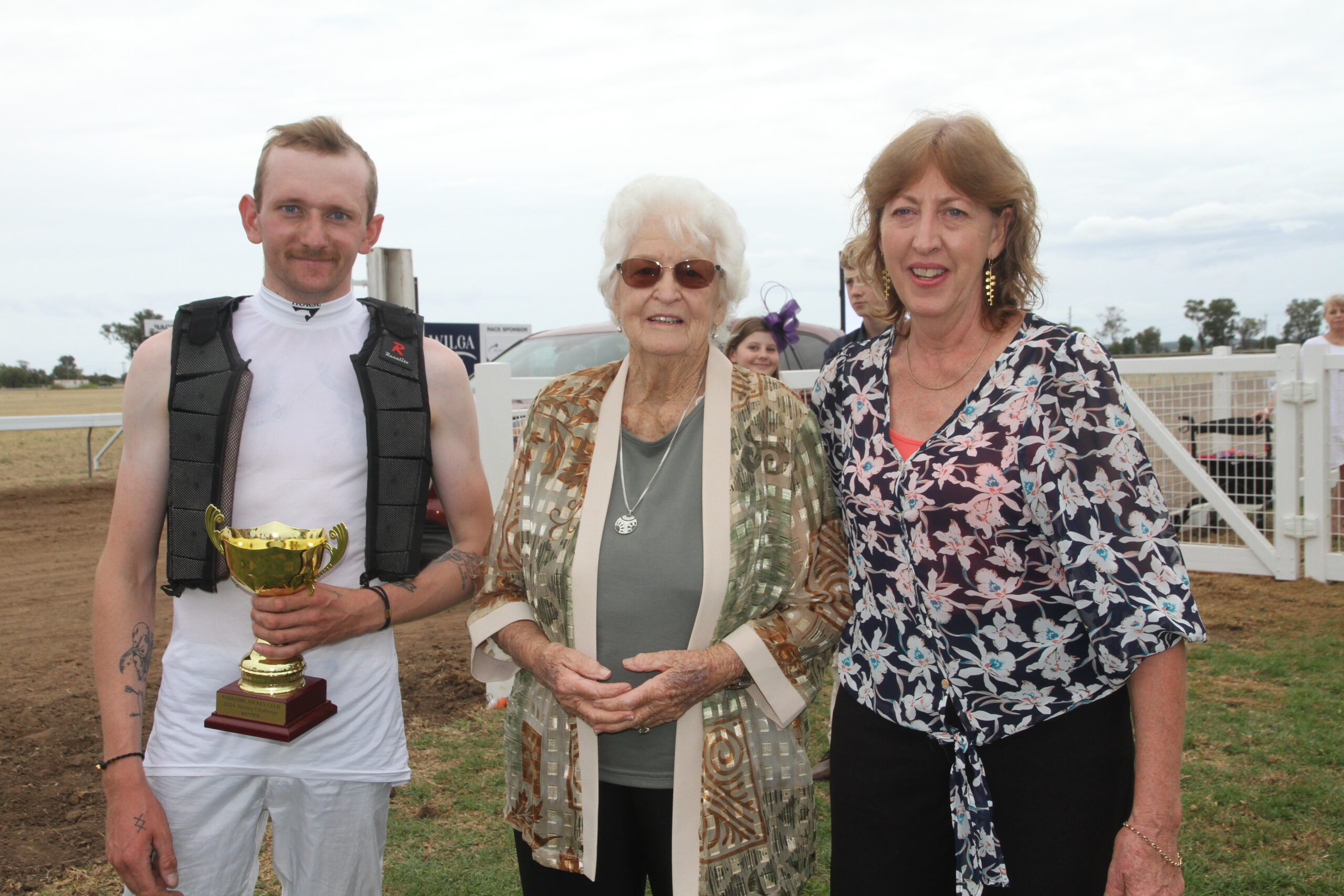
Shirley Jonas, centre, returned to the Narrabri Races to present the Jockey Challenge cup to Cobi Vitler, left. Also pictured is Sharon Rock.
Shirley and Barry had been training with Pratten Crag for a long time, and Shirley was particularly fond of his part-owner, Ivan Dellar.
“The best thing about winning that race was, Ivan had been sick for a long time, and we knew he didn’t have much time left, and when we told him I was going to ride Pratten in the race, he said, “All I want to do is see Shirl win a race on my horse and I’ll be ready to die.”
And he did, seven months later.
It was also because of Ivan that Shirley came to be in ownership of the cup, which she still has to this day.
When it was presented to Ivan and Judy McColl on behalf of her late husband Peter, Ivan turned around and gave the cup to Shirley, for riding Pratten in the race.
“It was so lovely that Ivan turned around and gave it to me, so I had a memento of what I did,” said Shirley.
Besides knowing she’d ridden the winner; Shirley had no idea that she’d made history as the first woman in NSW to compete and win a race against men jockeys, that came later.
Besides the only other woman she knew doing trackwork in Tamworth, she knew of one other from Queensland, whose husband was a trainer.
“There were probably other girls riding track horses but had never ridden in a race, or never been invited to,” said Shirley.
Whether she thought about it or not, Shirley Jonas does not strike you as a woman who is going to wait for an invitation to ride, nor did she wait on a mentor to train, and learn to ride.
“I didn’t know, you do the thing that you would normally do, and when you’ve been doing it since you were 16, you don’t think about it,” said Shirley.
“The only training I had was when they’d throw you on a horse and say go work at half pace, and you just go and do your best.”
“When you work racehorses, different days you work at different paces – so you learn how to work every pace.”
Since women were not invited, or encouraged to race back in 1979, Shirley faced another interesting situation: there were no women’s jockey rooms at racecourses at the time.
“No, they didn’t have a women’s jockey room, so it was a bit of a puzzle, they didn’t know what to do with me,” said Shirley.
“The next year when I raced in Moree, I might have had to change in the back of a horse float, but I can’t remember back that far.”
One thing that Shirley can attest to, is that despite a lack of facilities, out here in the bush where she was well-known, she was never treated any differently to the men jockeys, which may not have been the case for women elsewhere.
Shirley didn’t truly comprehend what her victory meant for other women, until sometime after the event. And in fact, some of her family neither knew that she raced or that she’d set a record.
“There are things you do through life that you don’t really think about, what I did was probably what hundreds of other people and girls do, every day,” said Shirley.
A truth for this day and age, but still, the undeniable fact was, that in 1979, Shirley was the only, singular woman, in NSW.
When she won that horse race, no one else had done it at the time.
“Plenty of other women could’ve done it too, but they wouldn’t have been encouraged, and maybe been considered only good enough to muck out the boxes and dress the horses…”
“That’s all women were considered good for, you were an accepted strapper – I was lucky because my husband and I did it ourselves, we didn’t employ anyone, we just had enough horses to suit us.”
“Things are so different in life for different people.”
The next year, Shirley was really pleased to see more women start riding in the picnic races.
“Girls like Rhonda Haire started popping up, she started riding in the picnic races, and different women started popping up everywhere,” said Shirley.
“Seeing that participation was important because it gave girls a bit of a leg up in the racing business instead of just being accepted strappers.”
After the cup race, Shirley didn’t feel inclined to get her official license, and instead went on to accomplish many more brilliant things, just by “doing what she wanted to do”.
After working as a barmaid and owning a craft shop in Narrabri, she went droving, then on to bull-catching on Lawn Hill Station in Northern Queensland.
In 1992, Shirley and her sister Jean co-owned a cattle station in the Kimberley, and when she was 70 years of age, she travelled around Queensland as an official drover’s camp cook.
“My only advice to women is: DO IT because I feel for the ones who are home while their husbands go to work or they go to work and stay in the same town or country doing the same things, then die of boredom and old age. So, whatever you want to do, just do it,” said Shirley.
“But you’ve got to want to make the opportunities too.
“I wanted to do things like ride in that race and I didn’t want to stay in one place.”
One thing that can be said about Shirley is that, whether she was just the woman who rode the horse that won the cup, she is certainly a woman who runs her own race.
“It was very nice of people to think of me, but take it all around, I rode the horse at the cup, but I didn’t win the cup because I didn’t own the horse,” said Shirley.
Shirley travelled from Kyogle to Narrabri at the invitation of her nieces; Amanda Brown and Merredith Jackson, to present the Jockey Challenge cup at the Picnic Races on Saturday, March 23, a date that coincided with the momentous occasion of their beloved late mother Ilma’s birthday.
To order photos from this page click here

